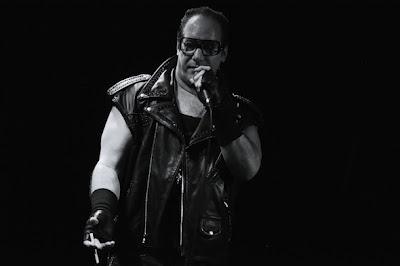An irreverent, operatic celebration of Father's Day.
by Paul J. Pelkonen

Actor, raconteur, comedian, renaissance man, father of two: Andrew Dice Clay.
His appearance on the site is in no way an endorsement of material performed in his act.
In the course of writing 28 operas, Giuseppe Verdi worked with many different librettos and literary sources. Yet the theme of fatherhood permeates his work, starting with his very first opera, the all-but-forgotten Oberto. In the spirit of Father's Day, here's a gift guide for the Verdi fathers, tailored to the plots of five of his most famous operas.
It takes until the third act for him to actually die, leading one to believe that a quality filtration system
For Rigoletto: (from his boss, the Duke of Mantua)
Andrew "Dice" Clay: The Day The Laughter Died.
Employed as a jester at the court of the Duke of Mantua, Rigoletto is victimized by the courtiers and cursed by a nobleman in the first act. He embarks on a tragic, downward spiral which results in the death of his daughter.
This 1990 double album by Brooklyn's own foul-mouthed, homophobic, misogynistic comic Andrew "Dice" Clay is a downward spiral of its own. It was recorded at Dangerfield's Comedy Club over the holiday season(!) and remains a...um...treasure-trove of "experimental comedy" which the hunchback could use as fresh material. Like Rigoletto's Don Rickles shtick, it's just not that funny.
For Simon Boccanegra: (from his old friend Jacopo Fiesco) Reverse Osmosis 5-Stage Water Treatment Simon, a buccaneer in service to the Genoese government is elected as an unlikely, but effective Doge of Genoa in Verdi's complex political opera. However, the Boccanegra administration comes to an early end when the ruler drinks poisoned water in Act II.
It takes until Act III him to actually die, leading one to believe that a quality filtration system could have saved his life and prolonged his reign. Until the next election, anyway.
For Giorgio Germont (from La Traviata):
19" Professional Roulette Wheel"
"Rehab" was a non-existent idea in 1850s Paris. Germont pére might not have been so embarrassed at his son's debts if he'd arranged to have a nice casino-themed rec room built into the family's Provencal manor.
Alfredo could have gone downstairs and played with this handsome roulette wheel--constructive therapy for any young rake with a gambling problem--instead of chasing girls.
For Philip II (from Don Carlo):
Grill Pro GRP33666 Grill Pro Electrical Charcoal Starter
Don Carlo is best known for its impressive Act III auto-da-fé, where heretics are burned at the stake in front of the Cathedral of Valladolid to celebrate the coronation of Philip II--even though Philip is already King when the opera starts. (Maybe he just felt like burning some innocent people.)
Since the Catholic Church of the time might have viewed matches as an invention of the Devil (remember, they were called "lucifers!") the King could help them out with this handy-dandy barbecue lighting system. Of course, whatever Carlo got Dad for Father's Day wouldn't stop his old man from handing his son over to the Inquisition--a father has to be strict.
For Amonasro: (from Aida)
The Penguin Historical Atlas of Ancient Egypt by Bill Manley.
Ruler of the Ethiopians, King Amonasro is the last major character to enter Verdi's Aida, having been defeated by the Egyptian general Radames (who is in love with Amonasro's daughter Aida) during the intermission between Act I and II. The military leader then tries to winkle military secrets out of Radames, including which valley the Egyptian army is marching in during the next intermission. With this handy map of Ancient Egypt, Amonasro might have won the battle in the first place.
And one from Wagner....
For Wotan (from Brunnhilde and Siegfried) The Power of Now by Eckhart Tolle.
Eckhart Tolle's best-selling self-help tome is all about letting go of your anger and pain and living in the moment, something that the one-eyed God of the German pantheon should think about doing. Wotan is doomed from the moment he touches the Ring, and is unable to stop the "rolling wheel" of fate that will result in him being burned to death (offstage) in the last scene of Götterdämmerung. Since the poor bloke is onstage for roughly five and a half hours of the Ring, he might as well start living in the moment.

